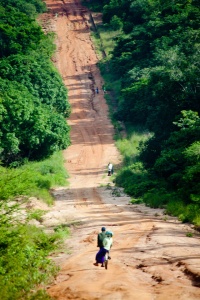In our general and sundry research in preparation to launch To Bless Africa, we have come across tons of fantastic, exciting, awesome (not to overstate or anything) like-minded ventures (like check this one out for example – www.mamahope.org – how cool is that?! I especially recommend their videos). These ventures are run by individuals and groups who are passionate about the people of Africa, who seek to make a difference, and who are changing the world. Perhaps not too surprisingly, the majority of the ventures we’ve come across are non-profit initiatives.
And yet – you may realize – we have chosen to pursue a different path: arising from the same desire to positively impact people’s lives, we have chosen to create a for-profit company, and you may wonder at that. Dear reader, wonder no more for we are about to substantiate our decision before your reading eyes (or at least attempt to!). There are in fact several different reasons why we chose to pursue this path, and not necessarily in order of importance, the reasons include:
Scalability (is that a word?) – Not-for-profit ventures generally would have a limited pool of resources they can draw from – what the people and organizations they can engage with donate to their cause; whereas a for profit venture, if they build efficient systems that can be replicated, multiplied, and scaled up, have a potentially limitless ability to increase their operations, thus – at least potentially – being able to multiply their impact indefinitely and quickly.
Promotability (that’s definitely not a word!) The ability to promote the business – to have a bigger marketing budget than a not-for-profit venture, would allow us to engage a bigger audience which in turn would help the business grow faster. The faster the business grows the more communities we can impact.
Efficiency (now that’s a word!) Profit would not, of course, be THE bottom line of this venture, but by having the profit of the business be one of the bottom lines, there’s an added pressure and accountability to use whatever resources are available to us with ideally the most efficiency, the least waste.
Flexibility (also a word, lots of points in Scrabble!)- By making this a private, for-profit business, accountable to a board of like-minded individuals who understand its purpose and objectives, we believe the company would have greater flexibility in trying out different methods and approaches with the least amount of bureaucracy. Furthermore, we’d have the flexibility of being able to offer outstanding customer service, a great return policy, etc, even if it costs more to us, because customer satisfaction then becomes one of our top priorities.
Perspective – The media is replete with depressing stories out of Africa. By connecting with vibrant partners in the continent, we hope to help portray a different Africa – a productive, enterprising, striving, creative, exciting, value-creating Africa; as opposed to the same old war-torn, impoverished, malnourished, corrupt, suffering Africa that we see in so many movies, news stories, and donations appeals.
Having worked with charities through most of our time so far in Africa, we have a deep appreciation for the tremendous work they are doing across the continent (and the world!)- from education to healthcare, to healthcare education; from clean water to better nutrition to better farming practices – and everything in-between – non-profits are directly affecting the lives of millions, perhaps hundreds of millions of African men, women and children on a daily basis for the better. Rock on!
But that, dear reader (you can start a sentence with ‘but’ if you’re using poetic license right? I’m sure I have my license here somewhere…) is why we have decided to pursue a different path!













